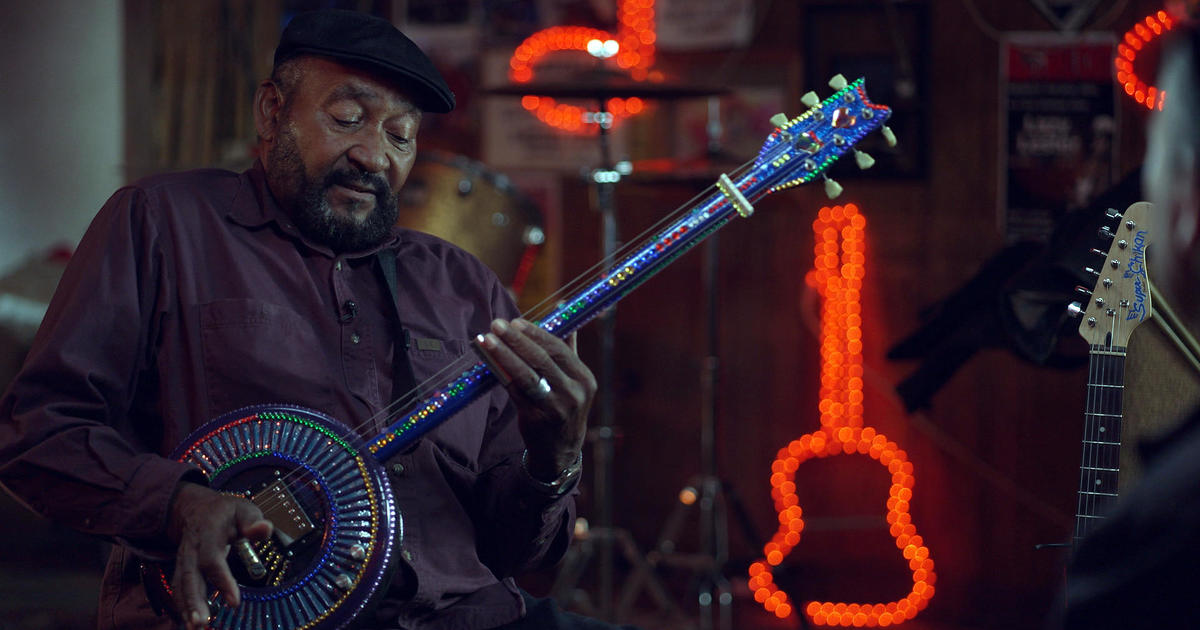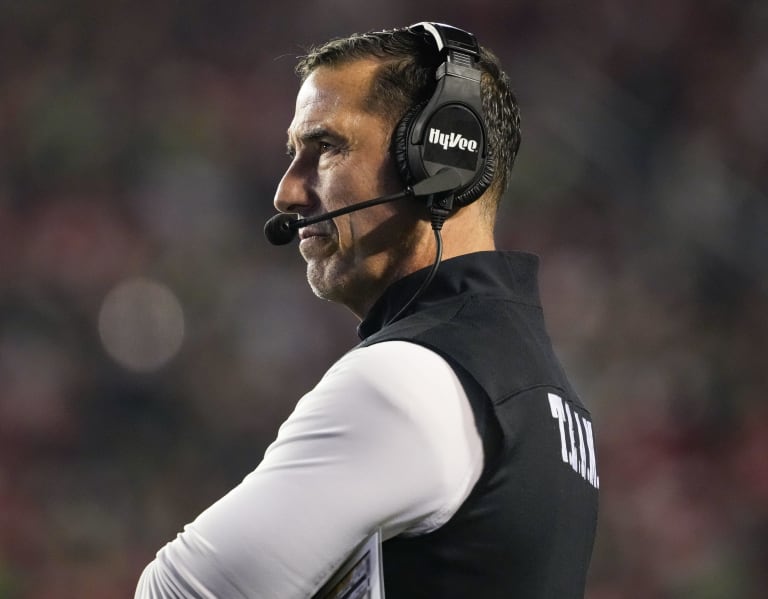Mississippi
Blues lives on in Mississippi as a cultural inheritance passed down through generations

Muddy Waters once sang: “the blues had a baby and they named it rock and roll.” But it’s more than rock… the blues makes a strong case for itself as the most influential sound in American music history… foundational to soul and funk, country, jazz and hip-hop. We wanted to check in on the state of the blues; so we headed to, well, the state of the blues… Mississippi and, specifically, to the town of Clarksdale… in the belly of the Delta… where the blues first flourished and where in recent years, there’s been something of a renaissance… showing the world that the granddaddy of American music still has chords left to play.
Head up Highway 49… and the Mississippi Delta thrums with the sound of the blues even before the music hits your ears.
At the annual Juke Joint Festival in Clarksdale, thousands flood this town to experience the Delta blues – in perhaps the last place it’s still thriving.
They come for those familiar licks and wails…songs of pain… and pride.
James Johnson goes by the name Super Chikan; and if you’re out to find the beating heart of the blues… he’s a good person to get to know.
Super Chikan: I never studied music– or had any music classes. I hear it and it sound good to me. And then I play because of the love of it.
Super Chikan: I make up my own sound, my own style.
This is how the blues still lives in Clarksdale…
…a cultural inheritance passed down through the generations. which is why this town of around 14,000 has surely produced more famous blues stars per capita than anywhere else on the planet.
Many of them, like Muddy Waters and John Lee Hooker, worked the surrounding plantations. Super Chikan, too… he brings his own kind of levity to those difficult memories.
Super Chikan: Bein’ a sharecropper, you have to have a rhythm to work to. And our favorite rhythm was the old choo-choo train. I tell the folks I grew up in a crack house. Our house had so many cracks in the wall, we had to stuff cotton in the cracks to keep snow out. Shoot that thang.
Jon Wertheim: You really lived that song?
Super Chikan: Oh yeah. I mean, I sing about the life I live.
Jon Wertheim: When did you start workin’ in the fields?
Super Chikan: Until I was big enough to go to the field, like three and four, I took care of the chickens. Five and six, I was in the cotton field, picking cotton, choppin’ cotton, what have you.
Experiences like these helped forge the blues in the Delta… where places like Clarksdale were built into boomtowns on the backs of slaves and later sharecroppers…
The music was a vessel for the Black experience… what started as field songs and spirituals evolved into a new sound… mixing slide guitar with a howl to the human condition.
Blues houses – juke joints – opened up. And by the 20s and 30s, stars emerged… like Robert Johnson who, per legend, went down to the crossroads outside of Clarksdale… and sold his soul to the devil in exchange for his guitar chops. A monument marks the spot where it happened… or not.
Super Chikan: Aaahhh, I heard a different story. A guy named Ike Zimmerman taught Robert Johnson how to play. Gave him a few licks to go on, somethin’ to start with. Gave him a pattern to go on.
Super Chikan Johnson might have inside information… Robert Johnson, he told us, was family.
Jon Wertheim: You realize Robert Johnson went to the crossroads, took guitar lessons from Zimmerman–
Super Chikan: Ike Zimmerman, yeah.
Jon Wertheim: Little bit less mystical than he sold his soul to the devil in exchange for learning to play guitar.
Super Chikan: Yeah.
Flavorful lore like this is what beckoned Sean “Bad” Apple, when he came to Clarksdale from Scranton, Pennsylvania, in the early 90s, and never left.
He opened his own blues club here where he serves as bartender, doorman, headliner… and he lives backstage. Clad in his… ornate stage clothes… he waxed nostalgic about the old blues scene.
Sean “Bad” Apple: When you’re in a juke joint it’s like, there’s gamblin’ in this corner, someone’s makin’ a baby in this corner, there’s a chicken fight right over here.
He says he’s sharply aware that he wasn’t born into this tradition… but tries to honor it as best he can, giving demonstrations on the blues’ evolution.
He showed us how the blues got repackaged for wider – and, frankly, whiter- audiences.
Sean “Bad” Apple: And then these young kids growin’ up like Mick Jagger and Paul McCartney, Robert Plant from Led Zeppelin all these bands were listening to this blues music. Clapton’s “I Went to the Crossroad.”
Jon Wertheim: That’s the Cream..
Sean “Bad” Apple: Yeah, that’s Cream’s version. But Robert Johnson, the blues man, that’s his song, I Went to the Crossroads.
Over the years, musical tastes changed. The local blues houses closed down, and farm work dried up. Today, Clarksdale sits in one of the poorest counties, in the poorest region of a stubbornly poor state.
Once vibrant, the downtown is crumbling.
Jon Wertheim: You’ve played all over the world.
Super Chikan: Yeah.
And a seasoned musician like Super Chikan, who’s won awards, toured internationally and had a long recording career… has to supplement his income by building guitars… and driving a truck.
Jon Wertheim: I heard of a guy though who travels the world and he’s got 10 albums. And he still drives a truck.
Super Chikan: I know a fella like that.
Jon Wertheim: Who’s that?
Super Chikan: His name Chikan. And I’ve been asked, “When you gonna record a new album?” I said, “For what? I got 10 of ’em out and they ain’t not one of them done me nothing yet.”
Even his fans don’t fully grasp that he’s still living the life he’s singing about.
Super Chikan: We got a lotta blues seekers that’s comin’ here, tourists comin’ here. They want the blues, you don’t want the blues, you want the blues music.
Jon Wertheim: They want the sound, they don’t want the underlying experience.
Super Chikan: That’s right, that’s right.
Jon Wertheim: If someone says, “Listen, I like the way you sound. I don’t need to hear about the experience underneath it all,” is that cool with you?
Super Chikan: Yeah. but it’s gonna come out in the song.
But recently… Clarksdale has been experiencing something of a resurgence. It’s no Nashville, but new shops and restaurants are opening up, and fresh fans and young musicians have been flocking to a place they see as the gravitational center of blues today.
Ghalia Volt hails from Brussels originally, and she is a fixture of the music scene here.
Jon Wertheim: How did you first get into this music?
Ghalia Volt: I guess from punk and rock and roll music. Just diggin’. Diggin’ and diggin’, trying to find what’s the real roots of the music I used to listen to until I got caught.
When she first came here in 2014, she traveled the Delta, absorbing blues truths from local masters, perhaps the closest this music gets to Juilliard.
Ghalia Volt: I was just watchin’ the guys play and learning from that. And trying, you know, in my room, so, “Okay, how does that sound.” You know, and oh, OK. And maybe I try to reproduce what they teach me. And they’re like, “Oh but this sound– this actually sounds really good.”
The sound she’s talking about? It cuts through the air at places like Red’s… a relic from the old juke joint days… here, modernity keeps its distance.
If you’re looking for a hand-crafted cocktail, this ain’t the place.
But the beer and the music flow in equal volume, late into the night… under the… watchful gaze of Red… one of the last Black blues club owners in Clarksdale…
Just a few blocks away… literally, on the other side of the tracks…
Morgan Freeman: There you are.
Jon Wertheim: Saturday night, Ground Zero.
Another venue…slightly more polished.
We met the proprietor here, too.
Big A: What’s up my brother from another mother.
Morgan Freeman: You know who, you know what, you know why.
Yes, that’s Morgan Freeman…
He spent his childhood in the Delta, keeps a home near Clarksdale, and, 22 years ago, opened Ground Zero Blues Club as a place to showcase the vast local talent. That’s Anthony “Big A” Sherrod on guitar.
Jon Wertheim: Can blues revive this town?
Morgan Freeman: It has.
We met Freeman for a drink, along with Ground Zero co-founder, Howard Stovall – whose family still owns the land Muddy Waters once worked as a laborer.
Morgan Freeman: When I was a little boy, four, five, these guys would come by, sit on my grandmother’s porch on a Saturday, drink gin, or hooch, or moonshine.
Howard Stovall: Moonshine.
Morgan Freeman: And play the blues.
Jon Wertheim: What is it about this music that has made it so durable, such a building block? What is it about the sound?
Morgan Freeman: Can we use the term “soul,” here? Because I think this is the music that comes directly from the soul. It’s just wrenched out of you. It’s palpable that they’re singin’ from deep.
Morgan Freeman: But the blues is the blues. There are chords and licks that you gotta do if you’re gonna play the blues.
Morgan Freeman: Dow dow dow, ding ding ding, dang dang dang dang, dow, dong dong, dong dong, ding ding. Dong dong dong, dong dong dong. Hard rock is my pillow. The highway is my home, so I might as well be dead. I’m just walkin’ and walkin’. Seems I have no place to go. The blues.
As the Delta town of Clarksdale, Mississippi leans into its blues past… its rebirth has given rise to a new blues superstar…the ultimate neighborhood kid-made-good. He’s a guitar phenom who learned his licks locally and who has been updating the blues for this century. He’s 24-years-old and has already won a Grammy. Ladies and gentlemen: Kingfish.
His real name is Christone Ingram. and he is the brightest blues star to come out of the Delta in decades…
He’s opened for the Rolling Stones and tours the world as a headliner…
And it’s not just blues die-hards who come out to see him. His uncanny guitar chops draw packed crowds.
And he draws frequent comparisons to Hendrix, Clapton, and, inevitably, another Mississippi native…
Jon Wertheim: So, if I said I read you were the next B.B. King, I should probably keep that to myself? Not let you — get that goin’ to your head?
Christone “Kingfish” Ingram: Hey, no, not at all. Plus, you know, I kinda think, you know, I love Mr. King’s music, that’s one of my favorite. But I kinda think I have my own thing goin’, as well.
Christone “Kingfish” Ingram: I’m more rough around the edges, I like to say I feel like I’m B.B. if he—
Jon Wertheim: If B.B. took off that suit?
Christone “Kingfish” Ingram: Yeah, and put him in some Jordans and you know, put his hat backwards, you know?
Kingfish was fresh off a Grammy win last year for best contemporary blues album when we saw him perform before a spirited crowd in Austin.
It was 600 miles and a world away from where he started out…in his hometown of Clarksdale…picking up gigs at the local blues clubs after school, starting at age 11.
Jon Wertheim: I think most people, you think of blues, and it’s sort of an older, maybe a weathered guy who’s had his share of struggles. Where you do you get blues in your mid-20s?
Christone “Kingfish” Ingram: I haven’t went through no divorce or anything like that, but I’ve definitely had my share of struggles. And, you know, anybody havin’ struggles, that’s the blues. Blues is life.
He was introduced to the blues by his parents and fell in love with the sound. Kingfish told us his musical tastes, his generous talent… as well as his generous physique…set him apart in school.
He found comfort in practice… obsessive practice… as we witnessed backstage… he works to master the old standards and also writes his own music.
Well aware that he is heir to a long line of blues greats from the Mississippi Delta…a rich history he weaves into his songs.
Jon Wertheim: What is it about this region that produces so many talented musicians? How do you explain that?
Christone “Kingfish” Ingram: As I have a song, there’s just somethin’ in the dirt, man. It’s just somethin’ about, you know, how we had, you know, you know, old blues guys, and ancestors who was down here that, you know, we got all that from, you know? It came from them.
Spend time in the Delta and it’s easy to see why the place enchants so many…
But the hardships jump out at you. Forty two percent of Clarksdale’s residents live below the poverty line. This was once a seat of the civil rights movement, and the legacy of Jim Crow lingers here.
That’s the Clarksdale Kingfish knows well.
Jon Wertheim: This is the old neighborhood.
Christone “Kingfish” Ingram: Yeah, man, this is Oakhurst. I grew up here…
When Kingfish was growing up, his gigs brought in much-needed money. He and his mother were homeless for a time.
Christone “Kingfish” Ingram: This is where all the moments happened: Me pickin’ up a guitar, you know. As you can see we still have some houses that are, you know, poverty stricken. You know, some parts of the city, you know, they don’t put money into or whatever. So.
Jon Wertheim: Still some struggle in the Delta.
Christone “Kingfish” Ingram: Yeah.
Jon Wertheim: You don’t hide that in your music.
Christone “Kingfish” Ingram: No, not at all.
Jon Wertheim: Why is that important to you?
Christone “Kingfish” Ingram: Because for one that’s also home. You know, that’s home, and I have to write about home. And that’s what we have to talk about today. We can’t talk about, you know, “Hoochie Koochie Man” forever.
Kingfish may be singing about the realities of Black life in Clarksdale, but he says that these truths don’t always connect with the Black community… difficult for him to miss when he looks out into the crowd at many of his performances.
Christone “Kingfish” Ingram: I come across a lot of, you know, people like me who say, “Well, you know, man we shouldn’t listen to that because that’s, you know, you know, that music reminds us of our pain. And, you know, it’s slave music.” And I get that. But, you know, we need to let it be known like, “Hey, man, this is a part of our culture. There wouldn’t be no 50 Cent, or Lil’ Wayne if it wasn’t for Son House and Robert Johnson, and the list goes on and on.”
Jon Wertheim: This is the family tree.
Christone “Kingfish” Ingram: Yeah, this is a family tree so we need to embrace that
He got his first real introduction to that history at a program run by Clarksdale’s small blues museum. We accompanied him on a visit… his first time back in years.
These after-school blues classes are where Kingfish first learned the basics of his instrument.
During a break in the music, we ran into one of the teachers.
… Big A… remember him? His voice still hoarse from his weekend gig performing at Morgan Freeman’s Ground Zero Blues Club.
Kingfish was six when he first met Big A.
Jon Wertheim: What was little Kingfish like?
Big A: He was bad.
Jon Wertheim: He said that.
Big A: He was bad. But he kept at it.
Jon Wertheim: Did you sense the talent early?
Big A: I knew he was gonna be somethin’.
For these kids, the program is about the music and the history.
It’s also, kingfish told us, about expanding their idea of opportunity… in a place where opportunity is not evenly distributed.
Jon Wertheim: We’ve seen a lot of new development here in Clarksdale over this blues tourism. What’s your opinion of that?
Christone “Kingfish” Ingram: (laugh)
Jon Wertheim: You’re laughin’
Christone “Kingfish” Ingram: I hope I don’t get in trouble. Through the years I’ve always seen, you know, money bein’ put into that, and it’s fine. I just wish more of the other neighborhoods would get some of that, you know, push and revitalization. When you step away from the actual “genre,” you go across the track: That’s the real blues.
Part of the appeal of Kingfish, he’s a thoroughly modern bluesman… updating the music in sound as well as subject matter…
Just as Elvis, Clapton and Hendrix borrowed liberally from the blues…
Kingfish is turning the tables, borrowing back from them…
His is a musical stew that mixes rock with funk, and jazz, plus muddy waters, B.B. King and Stevie Ray Vaughan.
Jon Wertheim: What else do you draw on?
Christone “Kingfish” Ingram: Gospel, I love Gospel music. That was, like, kinda one of my first loves. Hip hop as well. You know, some of my favorite rappers were storytellers: Biggie, you know, he could tell a story just like Robert Johnson. So, it’s all relative.
And Kingfish marries his sonic storytelling with a natural showmanship.
Still, with blues on the musical margins, not exactly dominating Spotify playlists… we wondered where this genre is heading.
Christone “Kingfish” Ingram: Blues is always gonna be around, you know. The genre may not be in the Billboard Top 200, but blues is always gonna be here.
Jon Wertheim: You’re not worried about the future?
Christone “Kingfish” Ingram: Nah. Not at all. There’s always gonna be a little kid somewhere that’s listenin’ to B.B., Stevie, anybody else, so yeah.
He’s too modest to say it, so we’ll say it for him…that little kid somewhere is also surely inspired by a bluesman from Clarksdale.
We’ll let Kingfish… take us out.
Produced by David M. Levine. Associate Producer, Elizabeth Germino. Edited by Sean Kelly.

Mississippi
Mississippi asks for execution date of man convicted in 1993 killing, lawyers plan to appeal case to SCOTUS

Mississippi Attorney General Lynn Fitch, a Republican, is seeking an execution date for a convicted killer who has been on death row for 30 years, but his lawyer argues that the request is premature since the man plans to appeal to the U.S. Supreme Court.
Charles Ray Crawford, 58, was sentenced to death in connection with the 1993 kidnapping and killing of 20-year-old community college student Kristy Ray, according to The Associated Press.
During his 1994 trial, jurors pointed to a past rape conviction as an aggravating circumstance when they issued Crawford’s sentence, but his attorneys said Monday that they are appealing that conviction to the Supreme Court after a lower court ruled against them last week.
Crawford was arrested the day after Ray was kidnapped from her parents’ home and stabbed to death in Tippah County. Crawford told officers he had blacked out and did not remember killing her.
TEXAS LAWMAKER PROPOSES BILL TO ABOLISH DEATH PENALTY IN LONE STAR STATE: ‘I THINK SENTIMENT IS CHANGING’
Mississippi death row inmate Charles Ray Crawford, who was convicted and sentenced to death in 1994 in the 1993 kidnapping and killing of a community college student, 20-year-old Kristy Ray. (Mississippi Department of Corrections via AP)
He was arrested just days before his scheduled trial on a charge of assaulting another woman by hitting her over the head with a hammer.
The trial for the assault charge was delayed several months before he was convicted. In a separate trial, Crawford was found guilty in the rape of a 17-year-old girl who was friends with the victim of the hammer attack. The victims were at the same place during the attacks.
Crawford said he also blacked out during those incidents and did not remember committing the hammer assault or the rape.
During the sentencing portion of Crawford’s capital murder trial in Ray’s death, jurors found the rape conviction to be an “aggravating circumstance” and gave him the death sentence, according to court records.
PRO-TRUMP PRISON WARDEN ASKS BIDEN TO COMMUTE ALL DEATH SENTENCES BEFORE LEAVING

During the sentencing portion of Crawford’s capital murder trial, jurors found his prior rape conviction to be an “aggravating circumstance” and gave him the death sentence. (iStock)
In his latest federal appeal of the rape case, Crawford claimed his previous lawyers provided unconstitutionally ineffective assistance for an insanity defense. He received a mental evaluation at the state hospital, but the trial judge repeatedly refused to allow a psychiatrist or other mental health professional outside the state’s expert to help in Crawford’s defense, court records show.
On Friday, a majority of the 5th U.S. Circuit Court of Appeals rejected Crawford’s appeal.
But the dissenting judges wrote that he received an “inadequately prepared and presented insanity defense” and that “it took years for a qualified physician to conduct a full evaluation of Crawford.” The dissenting judges quoted Dr. Siddhartha Nadkarni, a neurologist who examined Crawford.
“Charles was laboring under such a defect of reason from his seizure disorder that he did not understand the nature and quality of his acts at the time of the crime,” Nadkarni wrote. “He is a severely brain-injured man (corroborated both by history and his neurological examination) who was essentially not present in any useful sense due to epileptic fits at the time of the crime.”

Photo shows the gurney of an execution chamber. (AP Photo/Sue Ogrocki, File)
CLICK HERE TO GET THE FOX NEWS APP
Crawford’s case has already been appealed multiple times using various arguments, which is common in death penalty cases.
Hours after the federal appeals court denied Crawford’s latest appeal, Fitch filed documents urging the state Supreme Court to set a date for Crawford’s execution by lethal injection, claiming that “he has exhausted all state and federal remedies.”
However, the attorneys representing Crawford in the Mississippi Office of Post-Conviction Counsel filed documents on Monday stating that they plan to ask the U.S. Supreme Court to overturn the appeals court’s ruling.
The Associated Press contributed to this report.
Mississippi
Mississippi Highway Patrol urging travel safety ahead of Thanksgiving

The rest of the night will be calm. We’ll cool down into the mid to upper 50s overnight tonight. A big cold front will arrive on Thanksgiving, bringing a few showers. Temperatures will drop dramatically after the front passes. It will be much cooler by Friday! Frost will be possible this weekend. Here’s the latest forecast.
Mississippi
Ole Miss football vs Mississippi State score prediction, scouting report in 2024 Egg Bowl

OXFORD — There’s always an added element of intensity in the Egg Bowl.
It will be important for Ole Miss football (8-3, 4-3) to find an extra gear against Mississippi State (2-9, 0-7 SEC) in Friday’s rivalry matchup (2:30 p.m., ABC). The Rebels are coming off a deflating loss at Florida that left Ole Miss’ College Football Playoff hopes hanging by a thread.
Mississippi State is slogging through a difficult year under first-year head coach Jeff Lebby. While first-year head coaches have fared surprisingly well in Egg Bowl games over the years, the Rebels will be heavy favorites at Vaught-Hemingway Stadium on Black Friday. The game is just the second Egg Bowl in eight years not to be played on Thanksgiving.
Let’s dive into the matchup:
Why Jaxson Dart, Rebels’ offense should be able to extend drives
Usually defenses that force opposing into offenses into third-down situations fare well. For Mississippi State, completing the job on third down has been difficult.
The Bulldogs have allowed SEC opponents to convert on 70 of 147 third downs. That is 47.6%, and the worst mark in the SEC. Ole Miss’ defense, by comparison, is No. 5 in the SEC at 32%.
More broadly, the Bulldogs’ defense has been getting gashed in SEC play. Mississippi State has allowed 40.7 points per SEC game. Even if star Ole Miss receiver Tre Harris is out because of an injury, the Rebels have a good opportunity to light up the scoreboard like they did in a 63-31 win at Arkansas.
Can Ole Miss rack up the sacks, keep Dart upright?
Stats indicate Friday’s game will be easier for Ole Miss quarterback Jaxson Dart than Mississippi State quarterback Michael Van Buren Jr.
Mississippi State has allowed 35 sacks against SEC opponents. The inverse also bodes poorly for the Bulldogs. Mississippi State is last in the SEC in sacks. In 11 SEC games, the Bulldogs have just eight.
To make it harder on Van Buren Jr., Ole Miss’ defense leads the SEC in sacks. Look for him to get pressured early and often by a ferocious defensive line. There could − and maybe should − be two or three Rebels with multiple sacks in the Egg Bowl.
Rebels rushers Princely Umanmielen and Suntarine Perkins are prime candidates to feast. They each have 10.5 sacks, which ties them for No. 6 in the nation.
Will Ole Miss try to run up the score on the Bulldogs?
Aside from satisfying its fan base in a heated rivalry, Ole Miss has another reason to try to win big against Mississippi State. It’s the Rebels’ last chance to impress the College Football Playoff Committee.
Because of chaos in Week 13, the Rebels can still cling to an outside shot at making the College Football Playoff. While the Rebels will need other teams to lose Saturday, a dominating win Friday will only help their case.
On the flip side, even a narrow win against a Mississippi State team that hasn’t won a Power Four game this season would make it easier for the committee to exclude the Rebels.
Ole Miss football vs Mississippi State Egg Bowl score prediction
Ole Miss 42, Mississippi State 9: Each of the Rebels’ SEC games has resulted in one of two things: a close loss or blowout win. Expect the latter in the final regular season game at Vaught-Hemingway Stadium. Ole Miss has the pass rush to create turnovers that will overwhelm an outmatched Bulldogs team.
Sam Hutchens covers Ole Miss for the Clarion Ledger. Email him at Shutchens@gannett.com or reach him on X at @Sam_Hutchens_
-

 Science1 week ago
Science1 week agoTrump nominates Dr. Oz to head Medicare and Medicaid and help take on 'illness industrial complex'
-

 Politics1 week ago
Politics1 week agoTrump taps FCC member Brendan Carr to lead agency: 'Warrior for Free Speech'
-
/cdn.vox-cdn.com/uploads/chorus_asset/file/25739950/247386_Elon_Musk_Open_AI_CVirginia.jpg)
/cdn.vox-cdn.com/uploads/chorus_asset/file/25739950/247386_Elon_Musk_Open_AI_CVirginia.jpg) Technology1 week ago
Technology1 week agoInside Elon Musk’s messy breakup with OpenAI
-

 Lifestyle1 week ago
Lifestyle1 week agoSome in the U.S. farm industry are alarmed by Trump's embrace of RFK Jr. and tariffs
-

 World1 week ago
World1 week agoProtesters in Slovakia rally against Robert Fico’s populist government
-

 Health4 days ago
Health4 days agoHoliday gatherings can lead to stress eating: Try these 5 tips to control it
-

 News1 week ago
News1 week agoThey disagree about a lot, but these singers figure out how to stay in harmony
-

 Health2 days ago
Health2 days agoCheekyMD Offers Needle-Free GLP-1s | Woman's World




























